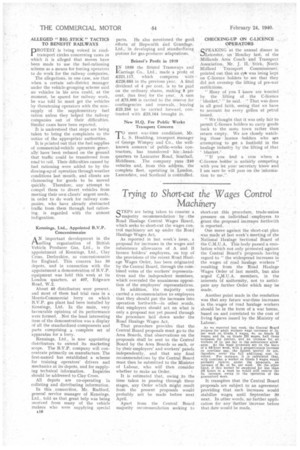Trying to Short-cut the Wages Control Machinery S TEPS are being
Page 18

If you've noticed an error in this article please click here to report it so we can fix it.
taken to counter a majority recommendation by the Road Haulage Central Wages Board, which seeks to short-cut the wages control machinery set up under the Road Haulage Wages Act.
As reported in last week's issue, a proposal for increases in the wages and subsistence allowances of A and B licence holders' employees, on top of the provisions of the recent Road Haulage Wages Order, has been originated by the Central Board, through the combined votes of the workers' representatives and the independent members, which overruled the unanimous opposition of the employers' representatives.
In addition, the majority vote carried a recommendation to employers that they should put the increases into operation forthwith—in other .words, that employers should act on what is only a proposal not yet passed through the procedure laid down under the Road Haulage Wages Act.
That procedure provides that the Central Board proposals must gcoto the Area Boards, that observations on the proposals shall be sent to the Central Board by the Area Boards as such, or by their employers' and workers' panels independently, and that any final recommendations by the Central Board must then be submitted to the Minister of Labour, who will then consider whether to make an Order, It is estimated that, owing to the time taken in passing through these stages, any Order which might result from the present proposals would probably not be made before next April.
Apart from the Central Board majority recommendation seeking to
short-cut this procedure, trade-union pressure on individual employers to grant' the proposed increases forthwith
is reported. .
One move against the short-cut plan was made at last week's meeting of the Natienal Haulage Sectional Board of the C,M,U.A. This body passed a resolution which not only protested against the Central Board's proposals having regard to " the widespread increases in the wages of road haulage workers " resulting from the Road Haulage Wages Order of last month, but. also urged Ci.M.H.A. members, in the interests of uniformity, not to anticipate any further Order which may be made.
Another point made in the resolution was that any future war-time increases in the wages of road haulage workers . should be in the form of a war bonus, based on and correlated to the cost of living figures issued by the Ministry of Labour.
As we reported last week, the Central Board propose for adult workers wage increases of 5s. per week on Grade I wages, 218. on Grade II wages, and 3s. on Grade 1III wages, half those increases for juniors, and an increase for all workers of ls per day in the subsistence allow.ance. As the wage proposals are on the basis of a 48-hour week, with a proportionate increase on overtime pay, the figures quoted do not. therefore, cover the full additional cost In. volved. For instance, it is caleulated that. with overtime, a worker on Grade I wagea would probably receive, under the proposals, an increase of 8s. or 96. per week. On the other hand, if this worker be employed for less than 48 hours in a week he would still receive the 5s. Increase. owing to the operation of the guaranteed week.
It transpires that the Central Board proposals are subject to an agreement providing that such increases would stabilize wages until September 30 next. In other words, no further application for any -further increase before that date would be made.




















































